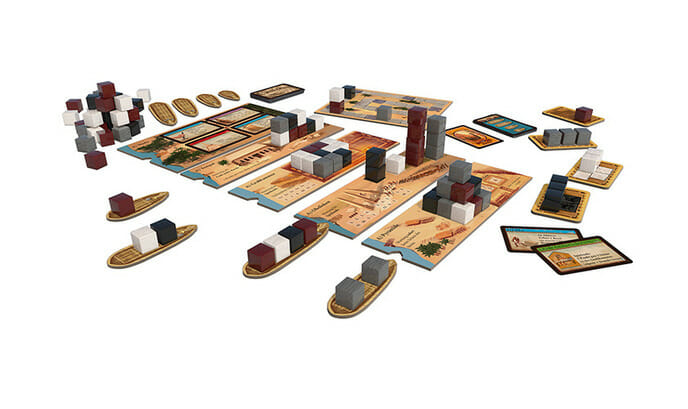The 10 Best Board Games of 2019
All images courtesy of each game's publisher. Games Lists Best of 2019
This was an exceptionally good year for new tabletop games, and I say that knowing, with regret, that there are so many more games I haven’t even gotten to try. I’m sorry Maracaibo, and my apologies to Barrage. Please give my regrets to the Adventure Games series, and tell Parks I’ll play them some time soon. In the meantime, however, here are my top 10 new games of 2019, with a few honorable mentions at the top as well.
Honorable mentions: Point Salad, Realm of Sand, Corinth, Villainous: Evil Comes Prepared.
10. Ankh’or
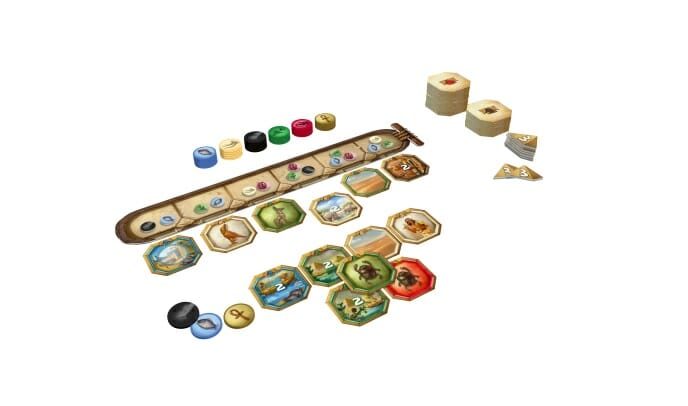
The second game in Space Cowboys’ small-box series aimed at two players—the first was a reissue of Jaipur, the best pure two-player game out there—Ankh’or plays two to four, but it works best with two. You can take one of just two actions on your turn: take three of the Splendor-like tokens you use as currency, or use them to buy one of the tiles available in the six slots in the market, the prices of which are set randomly at the start of each game. You’ll place 13 tiles in front of you over the course of the game, scoring points for creating adjacent groups of the same color or the same animal icons. You can also use orange ankh tiles to reset the market, filling in empty slots and moving tiles already there to the cheapest slots on the left, or to move a tile you’ve already placed. The rules are simple but there’s enough strategy required here to engage an experienced player.
9. Tapestry
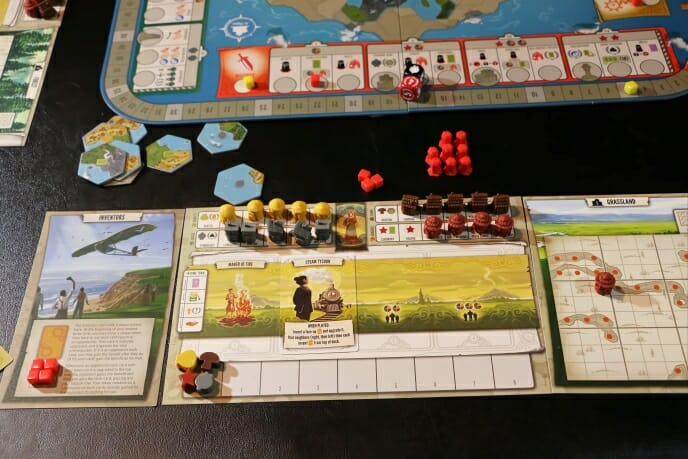
Every Jamey Stegmaier release comes with plenty of fanfare, as all of his previous games, including Scythe, Viticulture and Charterstone, have been well-received and come with high-quality art and components. Tapestry is his attempt to create a civilization-building game that is entirely playable in under two hours, and he mostly succeeded, although the gameplay itself doesn’t have the ‘feel’ of a typical civ-builder. Players collect resources to move themselves up four tracks around the main board, while also exploring new territories on the central and building houses (or, eventually, monuments) on their personal cities. The game forces you to make choices because your means are limited and the game itself doesn’t last long enough for you to do everything. It’s not a replacement for crunchier civ-builders, but can scratch that itch in a shorter playtime, with a rulebook that runs just four pages and lets you start playing far more quickly than most games in its genre.
8. Res Arcana
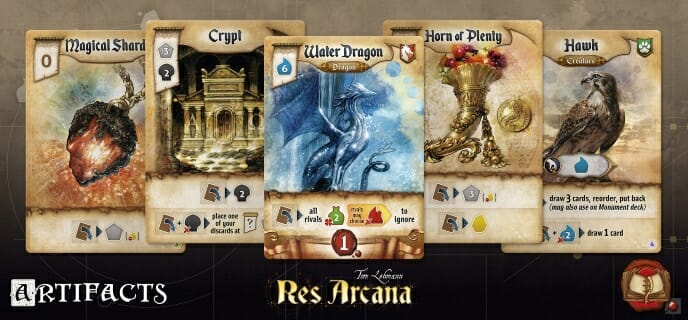
Tom Lehmann’s hit game still kind of weirds me out a little, because you start the game with a deck of eight cards … and that’s it. You don’t get more cards. You only get to draw one new card from your deck each turn unless you get a special ability somewhere else to draw another one. It makes me all twitchy to not automatically refill my hand at the end of each turn. We are gamers. Refilling our hands after each turn is just how we do. Yet Res Arcana isn’t a deckbuilder or hand management game at all: it’s an engine-builder, and the challenge is to build the best engine you can with the cards you get. Cards help you get the five “essences” that you spend to buy more cards or the more potent ‘places of power,’ which help you rack up a lot of victory points, or monuments, which are worth 1-3 points and usually give you a solid extra ability. When any player reaches 10 points, the game ends, and whoever has the most points wins. It plays in about an hour and there are enough cards to force some player interaction that it doesn’t have to be just a glorified solitaire experience.
7. Hadara
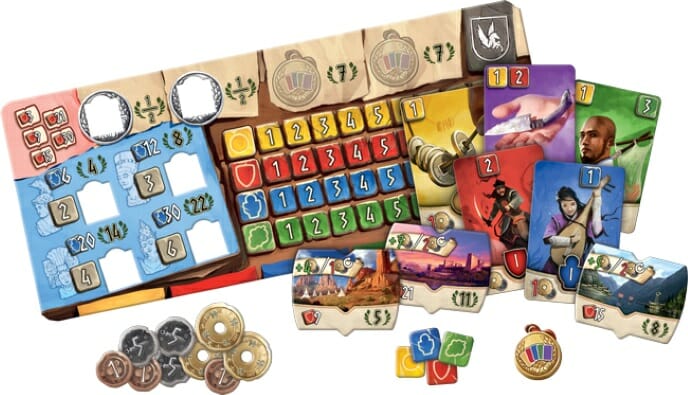
A great card-drafting game with a hint of 7 Wonders but a theme all its own, Hadara gets the civ-building card game mechanic on to actual boards, as players choose their cards from the central board and use them to move up four tracks (income, military, culture, food) on their own boards while building card tableaux for more points and money. The game has three rounds for different eras, with cards getting more expensive and more powerful in successive rounds. There are five decks for each round in different colors, and on each turn in the first phase of a round, you’ll draw two cards from one of those decks, playing one and discarding the other to the board. In the second phase, however, players will get to draw from the discard piles from the first phase. After each phase, you get income and may buy statues (with culture) or claim colonies (with military) for points and to move up resource tracks; at the end of each round, you have to have one food for each card in your tableau, and you can buy a ‘medal’ to gain points at game-end for your space on each track or for each set of cards in all five colors. Those medals were rather unthematic, but the rest ties together well and the simultaneous turns keep the games moving quickly. It’s not just like 7 Wonders but hits a similar sweet spot.
6. Imhotep: The Duel
This is the best two-player game of 2019 for folks who aren’t experienced gamers. Phil Walker-Harding, who appears further up this list, reimagined his Spiel des Jahres-nominated Imhotep as a true two-player experience, altering nearly all of the rules to force the players to interact and compete directly with each other. Whereas in the original game you placed your stones on ships and sent them to destinations, here you have meeples you place on a board to claim ships with tiles on them, tiles that can go to any of your four scoring areas or that give you additional powers (like the Market cards in the original). The player boards even have two sides, with the B sides encouraging more conflict. Games play in about 20 minutes and it’s quite portable too.
5. The Taverns of Tiefenthal
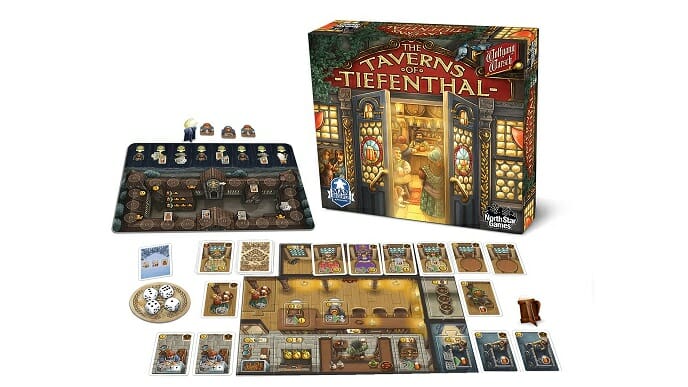
The brilliant Wolfgang Warsch is back with a game that is the spiritual sequel to The Quacks of Quedlinburg, although the similarities seem to stop with the similarly preposterous names. The Taverns of Tiefenthal is a dice-rolling-and-deck-building game where players try to build a more profitable tavern by brewing more beer, upgrading parts of their bar, and attracting more and better patrons, including nobles, who in turn earn you more money to brew more beer, upgrade parts of your bar, and attract more and better patrons. Warsch has a slew of hits under his belt already, including The Mind, That’s So Clever, and the (in my view) underrated cooperative game Fuji, and has a real knack for engaging games that play in under an hour—including this one, which I think is his next hit.
4. Noctiluca
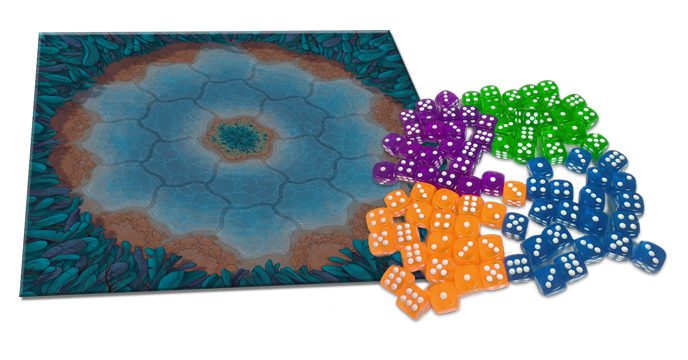
A cute dice-drafting game that leads players to pore over the board to figure out their best moves, Noctiluca is a surprisingly light game from the designer behind the worker-placement North Sea and West Kingdom series, which run 90 minutes and up. The entire game of Noctiluca revolves around dice scattered randomly across a board which you can pick up by their rolled values, taking all dice from one row or one column that match the value you choose. You take them to try to match patterns on your personal objective cards, trying them to finish as many of those as you can while keeping in mind the dwindling supply of dice. It’s visually appealing and younger players can play along because it doesn’t require reading or more than the simplest arithmetic.
3. Watergate

This brilliant two-player game takes its theme very seriously—and feels rather timely, too. The game is asymmetric, so one player plays Nixon while the other players the reporters from the Washington Post. The two sides compete to gain control of the seven potential witnesses; if the reporters connect at least two of them to Nixon on the game’s board by placing face-up evidence tokens, the reporters win, while Nixon tries to block them long enough to survive to the end of his turn. It assumes some foreknowledge of gaming mechanics, and the theme, while incredibly well laid-out in the rules and the accompanying reference material, only goes as far as the card text. If you remember this time or think we’re living through it all over again, it’s a fun, challenging experience.
2. Silver & Gold
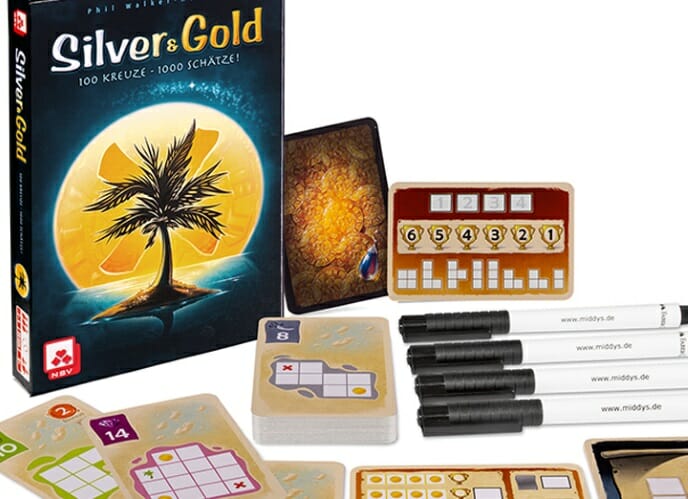
This simple yet highly replayable flip-and-write game from Phil Walker-Harding, who put two games on this list, has captivated every player to whom I’ve introduced the game. It’s a polyomino game, meaning that it has the Tetris-like shapes you’ve seen in lots of other games like Patchwork or Bärenpark, where each player has two larger shapes they’re trying to fill in with dry-erase markers by using the smaller shape revealed in each turn. Over the course of an entire game, you’ll get to use 28 of those shapes, filling a half-dozen or more of your own cards and scoring points for the ones you finish, as well as for filling in individual squares on those shapes that have coins or palm trees. There are just four ways to score points, and players fill in shapes simultaneously, so games move very quickly. Nothing was catching my #1 game but Silver & Gold is a wonderful filler game that you can play with almost anyone and that’s highly portable too.
1. Wingspan
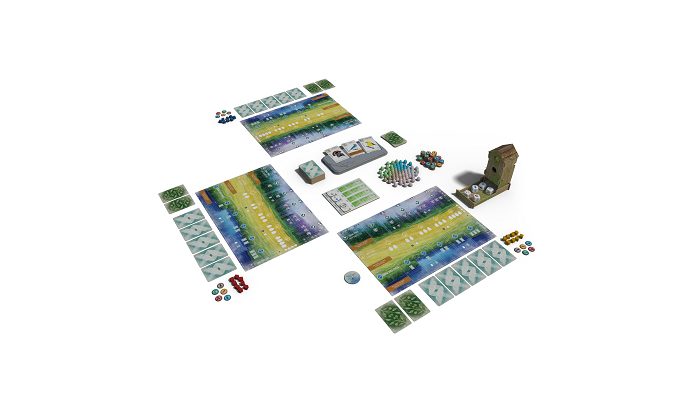
This can’t be a surprise, as I gave Wingspan the first and still only perfect score of 10.0 that I’ve given any of the 100+ games I’ve reviewed for Paste. It’s a marvel of a game, combining a great theme, easy to learn mechanics, sufficient depth to attract serious gamers, and tremendous artwork and components. Designer Elizabeth Hargrave is an amateur ornithologist and took her passion to the gaming table, building a complex game that uses the natural characteristics of over 150 bird species to define the game’s mechanics. You build habitats to attract birds and then utilize their abilities or just let them lay eggs and consume food for more points. It’s gorgeous to look at, educational in a subtle way, and plays in under an hour. It was my #2 game of the decade, behind my all-time favorite game 7 Wonders, and easily is the game of the year.
Keith Law is a senior baseball writer for ESPN.com and an analyst on ESPN’s Baseball Tonight. You can read his baseball content at search.espn.go.com/keith-law and his personal blog the dish, covering games, literature, and more, at meadowparty.com/blog.
